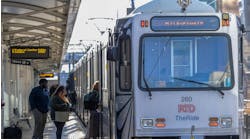NY: Transit Agencies Warn House Plan Could End Guaranteed Federal Aid
Source Gannett News Service
WASHINGTON — Upstate bus riders, Hudson Valley rail commuters and subway straphangers in New York City should prepare for more frequent breakdowns, service reductions and higher fares if a House transportation proposal becomes law, New York transit officials say.
That's because the proposal would cut off a dedicated federal funding source for mass transit.
Two House committees voted last week to eliminate the Mass Transit Account in the Highway Trust Fund that is funded by a 2.86-cents-per-gallon federal tax on gasoline, diesel fuel and kerosene.
"Like everybody else, we would cut service," said Joe Turcotte, general manager of the Tompkins Consolidated Area Transit agency, which serves 12,000 daily riders.
The plan, expected to get a vote in the full House later this month, would dedicate all of the trust fund to highway projects.
New York would get a 2.11 percent increase in federal highway money between 2013 and 2016.
But it's unclear what would happen to federal mass transit aid, which includes the $16 million the Genesee Regional Transportation receives for its 413-bus network, the $1.4 million the Ithaca area gets for its 55-bus Tompkins Consolidated Area Transit, and the more than $1 billion the Metropolitan Transportation Agency receives each year for a system that serves 8.5 million people daily.
House Republicans say their five-year, $260 billion transportation plan would provide $40 billion for a new Alternative Transportation Fund, but the revenue source has not been identified.
That makes year-to-year funding uncertain, according to transit officials, whose agencies use federal mass transit money for capital projects such as new buses, railroad repairs and equipment maintenance.
"Public transportation is not going to be a choice for anyone unless it's reliable," said Rich Perrin, executive director of the nine-county Genesee Transportation Council serving Rochester and surrounding areas.
The most devastating impact would be on the MTA, which oversees New York City subways and buses, as well as the Metro-North Railroad and Long Island Rail Road.
"These critical federal transit funds have been in place since 1983, when President Ronald Reagan signed the Surface Transportation Assistance Act into law," MTA Chairman and CEO Joseph Lhota said at a news conference Monday. "The proposal would substitute a reliable funding source with an undetermined and wholly unreliable commitment."
Transportation for America, a coalition of big-city mayors, business groups and advocacy organizations, announced Monday it is opposing the House GOP bill, saying it would unfairly punish users of mass transit, leave Americans with fewer transportation options, make the nation more dependent on oil, and undermine safety.
Meanwhile, the Senate is planning to consider a bipartisan $109 billion transportation plan that would cover only two years.
The problem facing both the Senate and House is that the Highway Trust Fund is running a $10 billion deficit this year and is on track to become insolvent sometime in fiscal 2013, which begins Oct. 1.
The Highway Trust Fund receives revenue from an 18.3 cents-a-gallon federal tax on gasoline and specialty motor fuels, a 24.3 cents-a-gallon tax on diesel fuel and kerosene, a 12 percent excise tax on the sale of heavy trucks and trailers, an excise tax on highway tires rated with a load capacity of more than 33,000 pounds and an annual use tax of up to $550 on vehicles weighing more than 55,000 pounds.
The Senate Finance Committee is scheduled to vote Tuesday to add several new revenue sources for the trust fund, including the "gas guzzler tax" on heavy vehicles with poor fuel economy and tariffs collected on imported vehicles.
Another source of revenue would be the tax that finances the Leaking Underground Storage Tank Trust Fund, which has $3.7 billion in unspent money and uses only about $100 million of the $300 million it collects each year. Two-thirds of the future tax revenue would be diverted to the Highway Trust Fund, along with the unspent balance.
New York Rep. Tom Reed of Corning said Monday he had not read the Senate proposals, but would consider them.
As a former mayor of Corning, Reed said he agrees with local officials that a dedicated revenue source is needed for mass transit. But he said such funding isn't needed until after the proposed House bill expires in 2016 because it guarantees $40 billion for mass transit.


